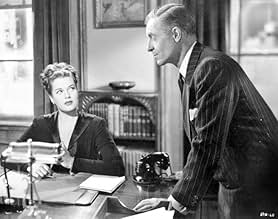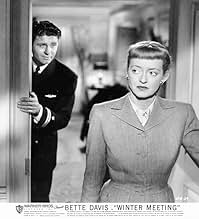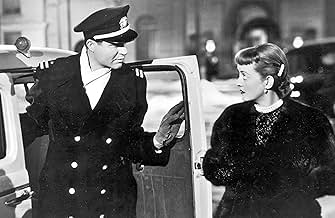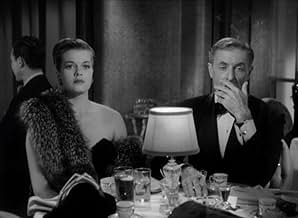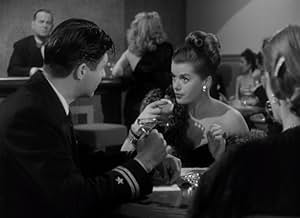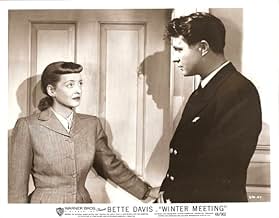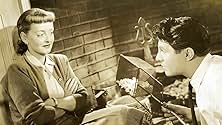IMDb RATING
6.2/10
1.6K
YOUR RATING
Bette Davis is a successful poetess who falls in love with a war hero in this romantic melodrama that is a moving film experience any time of year.Bette Davis is a successful poetess who falls in love with a war hero in this romantic melodrama that is a moving film experience any time of year.Bette Davis is a successful poetess who falls in love with a war hero in this romantic melodrama that is a moving film experience any time of year.
- Director
- Writers
- Stars
Jim Davis
- Slick Novak
- (as James Davis)
Woody Herman
- Leader - Woody Herman and His Orchestra
- (as Woody Herman and His Orchestra)
Lois Austin
- Marcia
- (uncredited)
Tex Brodus
- Restaurant Patron
- (uncredited)
Gertrude Carr
- Woman on Subway
- (uncredited)
Steve Carruthers
- Restaurant Patron
- (uncredited)
Douglas Carter
- Waiter
- (uncredited)
Hugh Charles
- Headwaiter
- (uncredited)
Russ Clark
- Man in Cafe
- (uncredited)
Franklyn Farnum
- Restaurant Patron
- (uncredited)
Bess Flowers
- Restaurant Patron
- (uncredited)
Charles Fogel
- Restaurant Patron
- (uncredited)
- Director
- Writers
- All cast & crew
- Production, box office & more at IMDbPro
Featured reviews
Bette Davis and Jim Davis have a "Winter Meeting" in this 1948 film about a spinster poetess and a heroic soldier. Based on a novel, it's an odd choice for a film, as it concerns two people wrestling with their inner selves. Both of them are carrying baggage, and each tries to help the other. That kind of scenario doesn't lend itself to the big screen.
There is a Waldo Lydecker character, this time named Stacy Grant, played by John Hoyt. He's the classy closet homosexual full of wit and vinegar who first introduces Susan (Bette) to Slick (Jim Davis), though he has invited his secretary (Janis Paige) as Slick's date. A morose man who obviously doesn't feel much like a war hero, Slick is interested in Susan, and the two begin a romance. She takes him to her house in Connecticut, a place filled with bad memories for her. There, the two fall in love and each discovers what's really bothering the other.
This is a slow moving film filled with dialogue - the lines almost outnumber the cigarettes. We're not used to dialogue anymore - it doesn't leave enough time for the special effects. What's off-kilter in this movie is the direction and the inexperience of Jim Davis, who later would achieve great fame as Jock Ewing on "Dallas." People on this board have said Bette Davis cringed during their love scenes, why did she agree to have him as her co-star, etc. First of all, she was crazy about him as a person and wanted to help him in his career, though that never materialized. I think I remember reading he went to Korea or something and when he got back, she'd never heard of him, though he did have an autographed photo of her as proof that he knew her. Secondly, Bette Davis was not Katharine Hepburn. Hepburn liked to surround herself with the best of the best; Davis, as she grew older, became more insecure and eventually wanted people around her she could cow. She hadn't quite reached that stage yet in "Winter Meeting," but we can see the early signs. She was on her way out at Warners and wasn't given a strong director who really could have pulled this together.
Despite this, Davis gives a very restrained performance; she's excellent. The problem is, why would a returning soldier be interested in her when he has Janis Paige hanging all over him? It stretches credibility. Paige here looks like a cross between a young Jane Fonda and Teri Hatcher - she's gorgeous. Davis looks like the atypical 1940s spinster aka career woman - tailored clothes and severe haircut. Pre-code career women had so much more fun - they dated, they went to bed with men, and they looked good. Then somebody decided it wasn't moral, and all girls should be married, and if you aren't, you'll end up frustrated and wearing suits like Davis wears in this. One can understand a serious young man like Slick being attracted to Davis' intelligence, and if she had looked the way she looked later on in the film (apparently after they had sex), one could have bought it so much more easily.
"Winter Meeting" is worth seeing for a wonderful Davis performance and the thought-provoking character studies. Though awkward at times, it's nevertheless interesting, and one does care about both of the main characters. You can't say that about some of the films today.
There is a Waldo Lydecker character, this time named Stacy Grant, played by John Hoyt. He's the classy closet homosexual full of wit and vinegar who first introduces Susan (Bette) to Slick (Jim Davis), though he has invited his secretary (Janis Paige) as Slick's date. A morose man who obviously doesn't feel much like a war hero, Slick is interested in Susan, and the two begin a romance. She takes him to her house in Connecticut, a place filled with bad memories for her. There, the two fall in love and each discovers what's really bothering the other.
This is a slow moving film filled with dialogue - the lines almost outnumber the cigarettes. We're not used to dialogue anymore - it doesn't leave enough time for the special effects. What's off-kilter in this movie is the direction and the inexperience of Jim Davis, who later would achieve great fame as Jock Ewing on "Dallas." People on this board have said Bette Davis cringed during their love scenes, why did she agree to have him as her co-star, etc. First of all, she was crazy about him as a person and wanted to help him in his career, though that never materialized. I think I remember reading he went to Korea or something and when he got back, she'd never heard of him, though he did have an autographed photo of her as proof that he knew her. Secondly, Bette Davis was not Katharine Hepburn. Hepburn liked to surround herself with the best of the best; Davis, as she grew older, became more insecure and eventually wanted people around her she could cow. She hadn't quite reached that stage yet in "Winter Meeting," but we can see the early signs. She was on her way out at Warners and wasn't given a strong director who really could have pulled this together.
Despite this, Davis gives a very restrained performance; she's excellent. The problem is, why would a returning soldier be interested in her when he has Janis Paige hanging all over him? It stretches credibility. Paige here looks like a cross between a young Jane Fonda and Teri Hatcher - she's gorgeous. Davis looks like the atypical 1940s spinster aka career woman - tailored clothes and severe haircut. Pre-code career women had so much more fun - they dated, they went to bed with men, and they looked good. Then somebody decided it wasn't moral, and all girls should be married, and if you aren't, you'll end up frustrated and wearing suits like Davis wears in this. One can understand a serious young man like Slick being attracted to Davis' intelligence, and if she had looked the way she looked later on in the film (apparently after they had sex), one could have bought it so much more easily.
"Winter Meeting" is worth seeing for a wonderful Davis performance and the thought-provoking character studies. Though awkward at times, it's nevertheless interesting, and one does care about both of the main characters. You can't say that about some of the films today.
7jhkp
I've seen this film a few times, and, perhaps because I'm an admirer of Miss Davis, I've always enjoyed it. Her performance of the long scene in the country house is really magnificent. Brilliant, thrilling acting, of the highest order. I enjoyed the dialogue very much, because, unlike many films, we really get to hear someone let out their innermost thoughts and it's very much like such a scene would be in real life. I think you have to be in the mood for this picture, and it will not strike everyone the same way - but it would be sad not to be able to identify or sympathize with characters trying to come to grips with sad facts in their past, because that's all of us, at one time or another.
First off you get Betty Davis who can deliver films up like a chocolate treat. Then the story is one to ponder and takes its place in the genre as part of lifes big picture and our personal journeys along the way. Two people meet and instead of selfish pursuits of which some takes place, they discover the true purpose of the meet to begin with but only after they have lived through it all. This concept can apply to all of our wanderings and gives us a reason to pause and ponder while pursuing things and going from point A to point B. Nicely done talkative film and acted out to perfection this leaves you with afterglow for watching it. For those that like to eat while watching (I do), nice scene with bacon and pancakes with hot maple syrup and delicious coffee. Have yours ready and join in or choose your own delight and go for it. Listen to the dialog, watch the scenes and receive this...
Bette Davis stars as lonely NYC poetess Susan Grieve. Her best friend Stacy (John Hoyt) asks her to accompany him on a blind double date along with visiting war hero Slick Novak (Jim Davis) and Stacy's secretary Peggy (Janis Paige). The sparks are immediate between Susan and Slick, and they spend a snowy weekend together in the country where they both confront deep-seated issues.
Bette Davis is dependably good, but Jim Davis is one of the worst regularly-employed actors in Hollywood history. Watching him struggle through his lines is almost as painful as it is humorous. When his character finally reveals his "dark secret", it elicited a chuckle rather than a gasp, which I don't think was the intention. The film's high point is a surprisingly open performance by John Hoyt as the proverbial "gay best friend" from countless future romance films. Of course it's never explicitly stated that Hoyt's Stacy is gay, given this is still the production code era. It's not a mocking or condescending performance, either, which is doubly surprising for the time. Some of the dialogue between he and Davis has a pre-Code vibe, rich in double entendre. If only his character had been in service of a better story and movie.
Bette Davis is dependably good, but Jim Davis is one of the worst regularly-employed actors in Hollywood history. Watching him struggle through his lines is almost as painful as it is humorous. When his character finally reveals his "dark secret", it elicited a chuckle rather than a gasp, which I don't think was the intention. The film's high point is a surprisingly open performance by John Hoyt as the proverbial "gay best friend" from countless future romance films. Of course it's never explicitly stated that Hoyt's Stacy is gay, given this is still the production code era. It's not a mocking or condescending performance, either, which is doubly surprising for the time. Some of the dialogue between he and Davis has a pre-Code vibe, rich in double entendre. If only his character had been in service of a better story and movie.
"Winter Meeting" is a film that doesn't add anything to Bette Davis' distinguished career in the movies. The melodrama is undermined by a completely miscast Jim Davis, who makes the picture worse than it deserved to be. The part of Slick Novak should have gone to another actor that could have added a few more sparks to the movie.
As directed by Bretaigne Windust, "Winter Movie" is a dull attempt to bring the novel in which it's based to the screen. The adaptation leaves a lot to be desired.
The basic problem with the film is one of credibility. We don't believe, for one second, Slick Novak, the hero Navy lieutenant would even look at Susan Grieve at all, let alone be romantically involved with her. It's easy for us to understand why Susan would make a fool of herself in letting Slick come into her life. After all, plain Susan was no competition for gorgeous Peggy, who is all over Slick at the night club, and clearly wants him.
Stacy Grant, the man about town, kept reminding us of a subdued Waldo Lydecker, from "Laura", in the way he tries to get Susan under his influence. He wants to expose her to a society that she doesn't care to belong. This role was one of the ways Hollywood dealt with the subject of homosexuality in those days. Everyone knew about them, but the movie making people wanted to keep Stacy and his ilk in a permanent closet.
Bette Davis underplays Susan with mixed results. Obviously, Ms. Davis had no influence for getting out of this second class melodrama unworthy of her talent. Then again, one questions her wisdom in letting a light weight actor like Jim Davis play opposite her, when it's clear he is not in her league.
The wonderful John Hoyt makes the best out of Stacy Grant and Florence Bates, one of the best character actresses of that era, is fine as the housekeeper who knows a lot about the mistress of the house. Janis Paige, in all her beauty and youth, doesn't have much to do.
This is a film to be seen as a curiosity more than a Bette Davis signature vehicle.
As directed by Bretaigne Windust, "Winter Movie" is a dull attempt to bring the novel in which it's based to the screen. The adaptation leaves a lot to be desired.
The basic problem with the film is one of credibility. We don't believe, for one second, Slick Novak, the hero Navy lieutenant would even look at Susan Grieve at all, let alone be romantically involved with her. It's easy for us to understand why Susan would make a fool of herself in letting Slick come into her life. After all, plain Susan was no competition for gorgeous Peggy, who is all over Slick at the night club, and clearly wants him.
Stacy Grant, the man about town, kept reminding us of a subdued Waldo Lydecker, from "Laura", in the way he tries to get Susan under his influence. He wants to expose her to a society that she doesn't care to belong. This role was one of the ways Hollywood dealt with the subject of homosexuality in those days. Everyone knew about them, but the movie making people wanted to keep Stacy and his ilk in a permanent closet.
Bette Davis underplays Susan with mixed results. Obviously, Ms. Davis had no influence for getting out of this second class melodrama unworthy of her talent. Then again, one questions her wisdom in letting a light weight actor like Jim Davis play opposite her, when it's clear he is not in her league.
The wonderful John Hoyt makes the best out of Stacy Grant and Florence Bates, one of the best character actresses of that era, is fine as the housekeeper who knows a lot about the mistress of the house. Janis Paige, in all her beauty and youth, doesn't have much to do.
This is a film to be seen as a curiosity more than a Bette Davis signature vehicle.
Did you know
- TriviaThis film was a huge box office failure, bringing in less than half the cost of production and promotion. It was Bette Davis's biggest flop at Warner Bros. and came after Jalousie (1946), another money-loser for the studio, causing Jack L. Warner to lose faith in Davis's box office appeal.
- GoofsWhen Stacey goes to Susan's apartment at the beginning of the film, he takes off a light-colored scarf. When he goes to leave, he puts on a much different and dark-colored scarf.
- Quotes
Stacy Grant: [to Peggy] Let me give you a piece of advice, culled from years of devestating experience. Next to loss of money, deafness, and skin disease, passion can be the most dangerous.
- ConnectionsFeatured in AFI Life Achievement Award: A Tribute to Bette Davis (1977)
- SoundtracksIf I Could Be with You
(uncredited)
Music by James P. Johnson
Played when Susan and Stacey arrive at the restaurant
Details
Box office
- Budget
- $1,927,000 (estimated)
- Runtime1 hour 44 minutes
- Color
- Aspect ratio
- 1.37 : 1
Contribute to this page
Suggest an edit or add missing content



